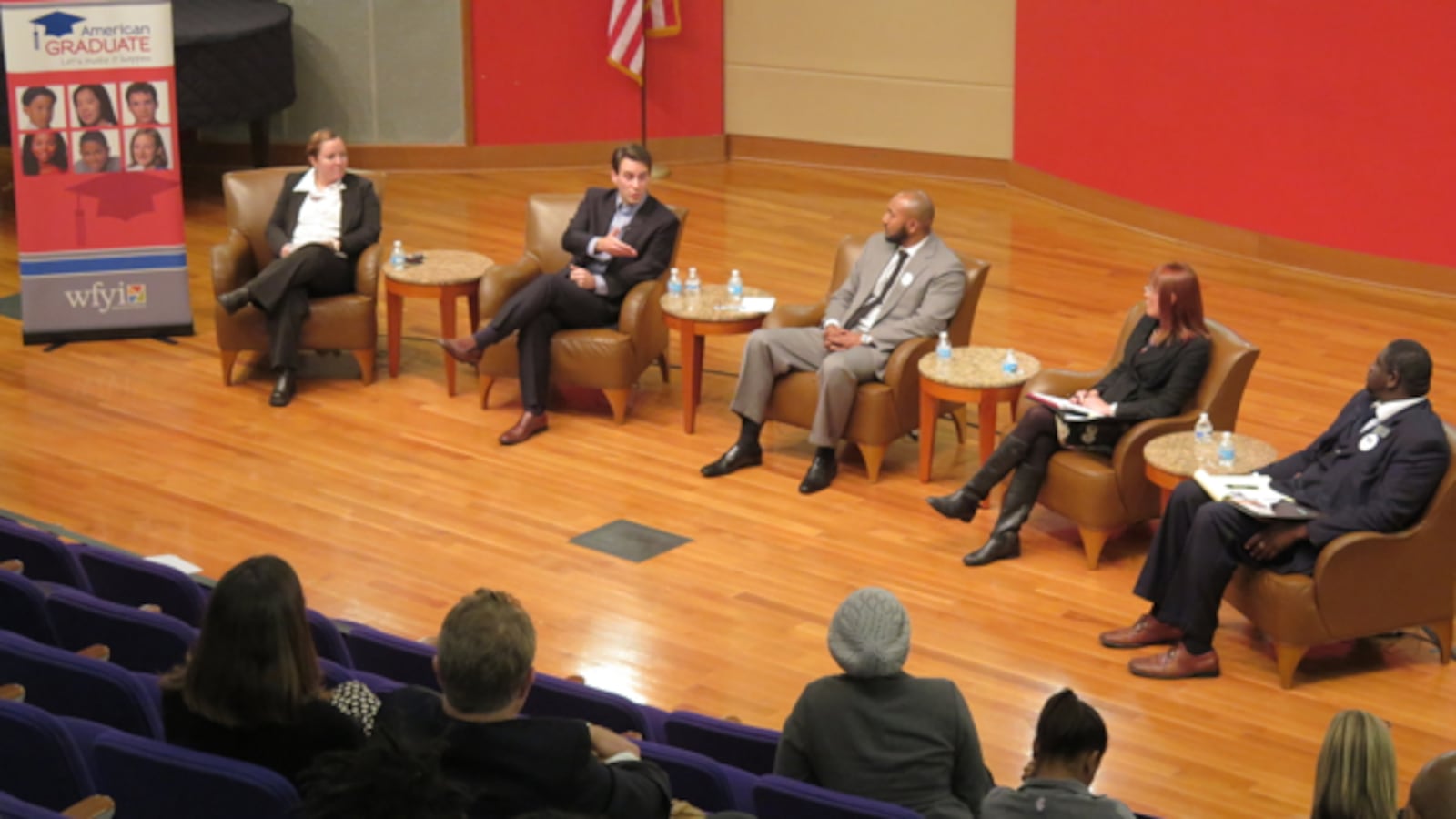Dividing lines began to emerge Thursday among the 10 candidates seeking three Indianapolis Public School Board seats at a candidate forum.
The event, held at the Central Library and presented by the education news website Chalkbeat Indiana in conjunction with the library and WFYI public television, featured the candidates answering questions from Chalkbeat’s bureau chief Scott Elliott and from an audience of about 100 people.
Five candidates are seeking an at-large seat on the board, which is voted on citywide. Incumbent Annie Roof, the school board president, is challenged by former state Rep. Mary Ann Sullivan, Light of the World Church Pastor David Hampton, Butler University instructor Josh Owens and Ramon Batts, a pastor and IPS athletics coach.
In District 5, on the city’s Northwest side, 16-year incumbent Michael Brown is opposed by LaNier Echols, a charter school dean. District 3’s incumbent, Samantha Adair-White, is being challenged by charter school dean and athletics director James Turner and Kelly Bentley, a former school board member who stepped down in 2010.
Of all the candidates, Ramon Batts was the most opposed to reforms that the board has moved toward, like partnering with charter schools who would take over IPS buildings or run IPS schools.
“I think we need to be strengthening what we have and using the space that we have to expand what we have,” Batts said. “Replicating our schools is what we should be about because we know that it works.”
Owens, Hampton and Sullivan, by contrast, endorsed the board’s recent moves toward partnerships and accountability-based reforms, saying that IPS should use whatever tools best support schools and kids, including charter partnerships. But, they said, simply promoting more of what IPS has already done is not enough.
“Replication of models is not as easy as it seems to be on the surface,” Sullivan said.
Schools need to create an environment where a school model can thrive within its community, she said.
“Particularly, top-down replication has not been a particularly successful way of changing schools,” she said.
Yet the candidates differed on specific classroom strategies that would better help children succeed.
Owens, who teaches economics at Butler, said that the district should use the data it collects to identify students who need help earlier, and take steps to catch them up. The sooner the district can figure out what kids need, the better chance that they won’t fail or leave school.
Similarly, Hampton said that teachers should do a better job measuring how students are learning but stop focusing so much on standardized tests such as ISTEP.
Roof, a candidate who has often voted to back changes her opponents also favor, said she just learned she was endorsed by the Indiana State Teachers Association. That group has fought ideas like expanding school choice and tougher teacher evaluation.
But Roof said she has long favored change in the district. She said she could back changes her opponents agreed with while also favoring ideas the union backs, liked a reduction in the number of tests students take.
“I’d like to reclaim the word reform,” Roof said. “I don’t think I’ve changed sides. I may have learned to become more cautious.”
The differences among the candidates are more pronounced in the district races, which are focused on particular sections of the city.
The incumbent board members in District 3, on the city’s North side, and District 5, in Northwest Indianapolis, said IPS is on the right track and defended the board’s progress.
“We put a lot of reforms through in my 16 years,” said Brown, who cited an expansion of magnet schools among other initiatives.
Adair-White said her biggest accomplishment of the board was the buyout of former Superintendent Eugene White and the hiring of new Superintendent Lewis Ferebee.
“I wanted to get rid of our superintendent,” Adair-White said. “We brought in Dr. Ferebee who has an open mind.”
But some of their challengers say more aggressive changes need to be made, like restructuring teacher pay, partnering with charter schools and giving more responsibility to school principals.
Echols, who is a dean at Carpe Diem Meridian Charter School, said she hadn’t entirely figured out how she’d handle potential conflicts of interest that might come up if she were both a board member and charter school employee.
“It’s a sticky situation,” she said.
Turner, who also works at a charter school, said the district shouldn’t partner with charter schools. Charter school companies running former IPS schools in state takeover, such as Howe and Arlington high schools, worked out badly, he said.
“Howe and Arlington,” Turner said. “Do I need to say more? I see what combining a charter model with IPS brings you. I’ve yet to see it work.”
Some candidates said it was a worry that their opponents are pulling in big money contributions — Bentley pulled in more than $40,000 so far from contributors both in and out of state and Echols raised more than $30,000. The other candidates in the district races have each raised less than $1,100.
There’s nothing wrong with large contributions, Bentley said.
“If you’re a person of integrity, all your constituents are important whether they wrote you a check or not,” Bentley said.
Adair-White she takes those big contributions to her opponents as a compliment.
“I am so flattered,” she said, “that someone has to go out and get $45,000 to beat little old me.”
(To compare IPS candidates’ positions against their competitors, visit our interactive election tracker.)

